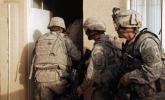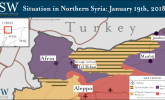Targeting the Diyala Suicide Bombing Network
March 6, 2008 - Institute for the Study of War
This backgrounder details al-Qaeda in Iraq’s shift to suicide bombings and the operations to dismantle the Diyala suicide bombing network.

This backgrounder details al-Qaeda in Iraq’s shift to suicide bombings and the operations to dismantle the Diyala suicide bombing network.

US policy should recognize that the Kremlin’s intent regarding Ukraine is maximalist, inflexible, and will not change in the foreseeable future. The West should stop expending resources trying to change a reality it does not control and focus on what it can shape plenty: denying Russia’s ability to wage a war against Ukraine. Negotiations, ceasefires, and peace deals are not off-ramps but rather on-ramps for the Kremlin to renew its attack on Ukraine in the future under conditions that advantage Russia. They are means to the same ends—full control of Ukraine and eradication of Ukraine’s statehood and identity. The vital US interest in preventing future Russian attacks on Ukraine can be best achieved by denying Russia the capability to carry out those attacks. The immediate requirement is preserving Ukraine’s momentum on the battlefield—accounting for a possible renewed offensive from Russia this winter—to ensure that Ukraine secures the most advantageous position possible. The West should also eliminate Russia’s ability to attack Ukraine in the future, including by denying Russia a military foothold in Ukraine from which to launch attacks, resisting "peace" deals that the Kremlin will use to buy time to reconstitute its forces, not empowering the Russian defense industrial complex with access to Western markets, and committing to building Ukraine's defensive capabilities over the long term.
ISW's Senior Intelligence Planner, Jennifer Cafarella, on deteriorating U.S. - Turkish relations and the Kurdish diaspora featured in The Hill.

Taliban Supreme Leader Hibatullah Akhundzada leveraged a recent gathering of Taliban-aligned religious leaders to consolidate power and advance efforts to implement a hardline governance program. Akhundzada is taking on a more proactive role as the Taliban navigates internal tensions and faces continued attacks from the Islamic State’s Khorasan Province (IS-KP).

The Taliban’s annual summer offensive in Afghanistan in 2014 can be characterized by waves of violence across the country and, in particular, a string of attacks ringing the capital, Kabul. The attacks appear mainly to target Afghanistan’s infrastructure, particularly its airports. Although the Taliban attempted to focus its efforts in June on the 2014 presidential election runoff, it was unsuccessful in derailing the elections or disrupting them to a notable degree. That period of concentrated effort lasted less than two weeks.

The Taliban government is struggling to defeat the National Resistance Front (NRF), a growing anti-Taliban insurgency in northeastern Afghanistan. Taliban leaders appointed a new slate of military commanders to lead anti-NRF operations, indicating dissatisfaction with the previous commanders’ performance. Political and ethnic divisions are also likely undermining Taliban forces. Continued Taliban failures against the NRF could lead to the strengthening of the Haqqani Network within the Taliban’s military leadership.

The Taliban achieved its primary objective by taking over Afghanistan in 2021. It now presides over a weak state that is unable to address long-term socio-economic and security challenges. Supreme Leader Hibatullah Akhundzada is worsening tensions within the Taliban as he expands his power within the regime and his policies are exacerbating the economic crisis the country faces.

Turkey launched an air-ground operation against the American partner force in Syria, the Kurdish People’s Protection Units (YPG), in Afrin district northwest of Aleppo City on January 20th, 2018. Turkey’s goal is to extend its buffer zone along the Syrian-Turkish border. Turkey may subsequently attack the town of Manbij, east of Afrin on the banks of the Euphrates River. Turkey’s operations threaten to provoke a widening Turkish-Kurdish war that could unravel the U.S. stabilization effort in eastern Syria, place U.S. service members in Manbij at risk, and force the U.S. to reconsider support for the YPG.

ISIS operations in Iraq are having an impact in Syria. Opposition groups are capitalizing on the redeployment of pro-regime and ISIS forces to make gains in Qalamoun and Damascus and to launch offensive operations in Aleppo.

This reference guide provides a baseline for identifying Syrian opposition groups. The guide aims to permit researchers to track how groups realign as the Russians commence operations. It seeks to inform the development of policies that aim to protect Syrian rebels willing to cooperate with the U.S. in order to defeat ISIS and marginalize al-Qaeda affiliate Jabhat al-Nusra.